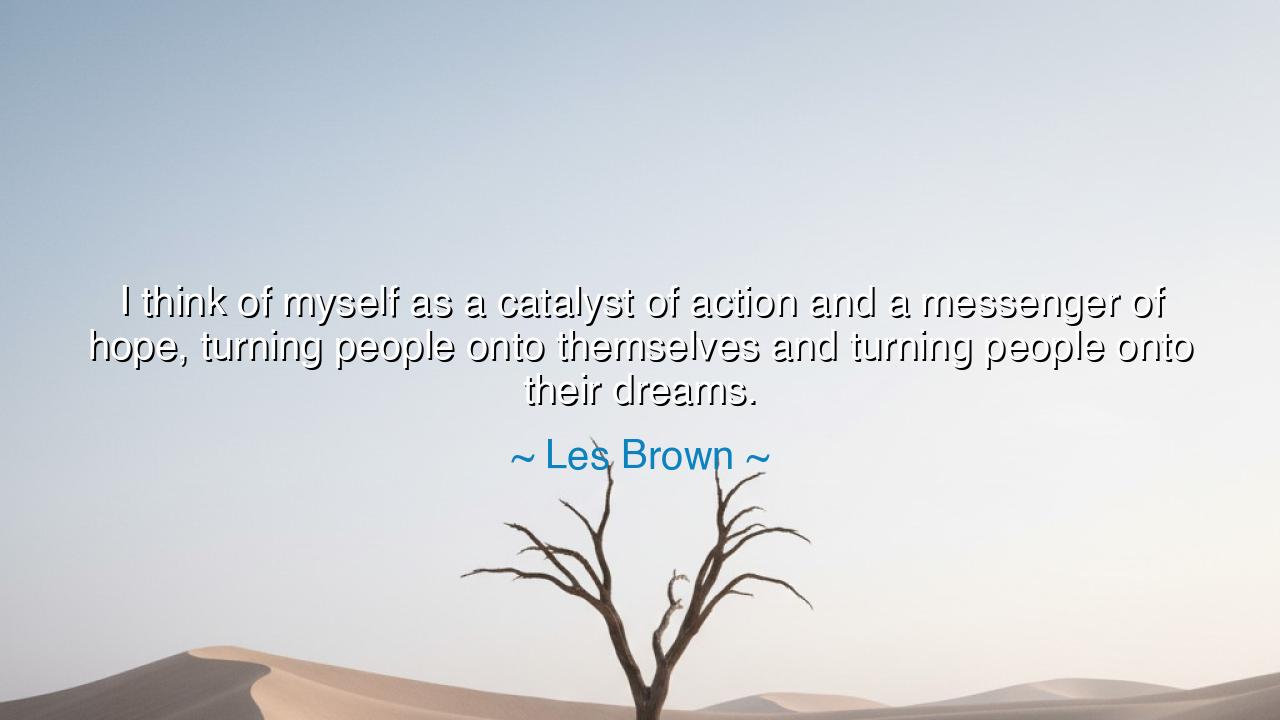
I think of myself as a catalyst of action and a messenger of
I think of myself as a catalyst of action and a messenger of hope, turning people onto themselves and turning people onto their dreams.






When Les Brown declared, “I think of myself as a catalyst of action and a messenger of hope, turning people onto themselves and turning people onto their dreams,” he spoke not as a man of mere ambition, but as a herald of human potential. His words rise like a call from the mountaintop, reminding all who hear them that greatness does not lie dormant in the stars—it sleeps within the human heart, waiting for the voice that dares to awaken it. Brown, born into hardship and raised in humility, became a living embodiment of transformation. He knew what it meant to rise from obscurity, to discover one’s own power, and then to ignite that same fire in others. His message is not just about inspiration—it is about rebirth, the alchemy by which ordinary souls remember their extraordinary purpose.
To be a catalyst of action is to be the spark that awakens motion where there is stagnation. The word “catalyst” comes from the realm of science, but its spirit is ancient—it is the power that transforms without being consumed. Brown saw himself as such a force, one who enters another’s life not to dominate or command, but to stir the still waters of potential. His voice, like the thunder that awakens a sleeping valley, was meant to jolt hearts from slumber. In every age, such catalysts have existed: prophets, teachers, reformers, and dreamers who dared to speak light into the darkness of resignation. They remind us that destiny is not bestowed—it is forged through awakening.
The second half of his declaration is even more sacred: he calls himself a messenger of hope. Hope, in its purest form, is not a gentle comfort but a powerful force—it is the wind that drives ships against the current of despair. Brown’s life was shaped by such wind. Born poor, labeled “educably mentally retarded,” he was told that greatness belonged to others. Yet through determination and belief, he rose to become one of the world’s most electrifying orators. His hope was not naive—it was defiant. It was the hope of one who had seen the pit and still chosen the climb. And now, he passes that flame to others, teaching that if he could rise, so can anyone who dares to believe.
Consider the story of Harriet Tubman, whose spirit mirrors this same calling. Once enslaved, she not only escaped to freedom but returned again and again to lead others out of bondage. She was a catalyst of action, a woman whose courage turned fear into movement. And she was a messenger of hope, whispering to the weary that freedom was real. Her strength did not lie in physical might but in faith—the conviction that her life could awaken others to their own. Les Brown, too, walks in that lineage of awakeners. Though his battlefield is not the plantation nor the prison, it is the mind itself—where the chains of doubt and fear are forged.
To turn people onto themselves is perhaps the most profound act of liberation. It means guiding others to rediscover the power already dwelling within them. Too often, the world teaches men and women to look outward for validation, for permission to dream. But Brown’s wisdom reverses the gaze: he reminds us that the treasure we seek lies within. The self, when fully awakened, becomes a fountain of vision, courage, and purpose. To “turn people onto their dreams” is to remind them that their aspirations are not foolish—they are the whispers of the divine urging them toward fulfillment.
This teaching is as old as humanity’s first stories. Socrates once said that he was a midwife of souls, helping others to give birth to their own wisdom. Les Brown stands in this same tradition. He does not give people their dreams—he reminds them that they already possess them. His gift is not to create light, but to uncover it. He shows that hope and action are the twin pillars of creation: one gives direction, the other gives motion. Together, they lift mankind from despair to destiny.
So, my children of tomorrow, hear this and remember: you, too, can be both catalyst and messenger. When you speak words that awaken others, when you act with courage that stirs the timid, you become a vessel of transformation. Nurture hope as you would a sacred fire—feed it with purpose, guard it against doubt, and share its warmth freely. Then, turn inward and rediscover your own dreams, for they are not fantasies but blueprints of what your spirit longs to build. In doing so, you will honor the wisdom of Les Brown and all who came before him: those who dared not only to dream, but to make others believe they could dream too. For in awakening others, you awaken yourself—and in awakening yourself, you help the world to rise.






AAdministratorAdministrator
Welcome, honored guests. Please leave a comment, we will respond soon